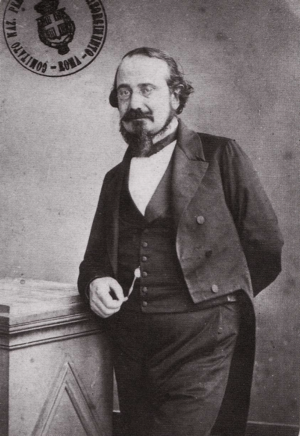Bertrando Spaventa facts for kids
Quick facts for kids
Bertrando Spaventa
|
|
|---|---|
 |
|
| Born | 26 June 1817 Bomba, Abruzzo, Kingdom of the Two Sicilies
|
| Died | 20 September 1883 (aged 66) |
| Nationality | Italian |
| Era | 19th-century philosophy |
| Region | Western Philosophy |
| School | Hegelianism |
Bertrando Spaventa (born June 26, 1817 – died September 20, 1883) was an important Italian thinker in the 1800s. His ideas greatly influenced how Italy became a united country and also shaped philosophy in the 1900s.
Contents
Bertrando Spaventa's Life Story
Bertrando Spaventa was the older brother of Silvio Spaventa, a famous Italian patriot. Bertrando grew up in a family that wasn't very rich. His mother, Maria Anna Croce, was the great-aunt of another well-known philosopher, Benedetto Croce.
Early Education and Moves
Bertrando studied at a religious school in Chieti and became a priest. In 1838, he and his brother moved to Montecassino. There, he taught math and public speaking at a local school. In 1840, he went to Naples to continue his studies. He learned German and English, which was special because it allowed him to read the works of foreign philosophers in their original languages.
Becoming a Philosopher and Journalist
In Naples, Bertrando joined groups that believed in freedom and new ideas. He became friends with thinkers like Ottavio Colecchi and Antonio Tari. He even started his own philosophy school. He also helped edit Il Nazionale, a newspaper started by his brother, Silvio.
In 1849, things changed. The king, Ferdinand II of the Two Sicilies, removed the country's constitution, and Silvio was arrested. Bertrando left Naples and went to Florence, then Turin. He stopped being a priest and started working as a journalist for several newspapers in Piedmont.
While in Turin, Spaventa became very interested in the ideas of Georg Wilhelm Friedrich Hegel, a German philosopher. Spaventa developed his own philosophical system and political ideas. He also argued against a Jesuit journal called La Civiltà Cattolica, which believed religion was necessary for human progress. Spaventa thought differently.
Teaching and New Ideas
In 1858, he became a professor of law philosophy at the University of Modena. Then, in 1860, he taught history of philosophy at Bologna, and in 1861, philosophy at the University of Naples.
In 1860, during his lectures in Bologna, he shared his theory about how philosophical ideas moved between Italy and Europe. People at the time thought Italian philosophy had always stuck to old traditions. But Spaventa wanted to show that modern, independent philosophy actually started in Italy, even if it became most developed in Germany.
He believed that philosophy in Italy in the 1800s was struggling because there wasn't enough freedom to think. This was due to the Counter-Reformation (a time when the Catholic Church tried to stop new ideas) and harsh rulers.
Spaventa also tried to connect Italian philosophers to famous European ones. For example, he linked Descartes to Tommaso Campanella, Baruch Spinoza to Giordano Bruno, and Immanuel Kant to Giambattista Vico and Antonio Rosmini. He also connected German Idealists to Vincenzo Gioberti. His goal was to make Italian philosophy more open to new ideas and less focused only on Italy. He strongly disagreed with nationalists who only cared about Italian ideas.
Influence and Politics
Bertrando Spaventa helped spread the ideas of Hegelian Idealism in Italy. His work deeply influenced Giovanni Gentile and Benedetto Croce. Croce even lived with Silvio Spaventa after his parents died and enjoyed Bertrando's lectures, especially because of their focus on freedom. Other students who followed his ideas included Sebastiano Maturi, Donato Jaja, Filippo Masci, Felice Tocco, and Antonio Labriola.
Bertrando Spaventa was also a Member of Parliament in the Kingdom of Italy for three terms. He was part of the Historical Right party. He supported government policies that were not based on religion and believed in a strong state. He thought that everyone should have the right to vote. He believed these ideas would help create a fair and balanced society where people and communities could grow in an "orderly and just" way.
Bertrando Spaventa's Writings
Bertrando Spaventa wrote many books and essays about philosophy. His works explored the ideas of other philosophers like Kant and Hegel, and he also wrote about political philosophy and religion. Some of his important writings include:
- The Philosophy of Kant and its Relation to Italian Philosophy
- Principles of Philosophy
- Studies on Hegel's Ethics
- The Philosophy of Vincenzo Gioberti
- Critical Essays on Political Philosophy and Religion
- The Doctrine of Knowledge of Giordano Bruno
See also
 In Spanish: Bertrando Spaventa para niños
In Spanish: Bertrando Spaventa para niños
 | Toni Morrison |
 | Barack Obama |
 | Martin Luther King Jr. |
 | Ralph Bunche |

